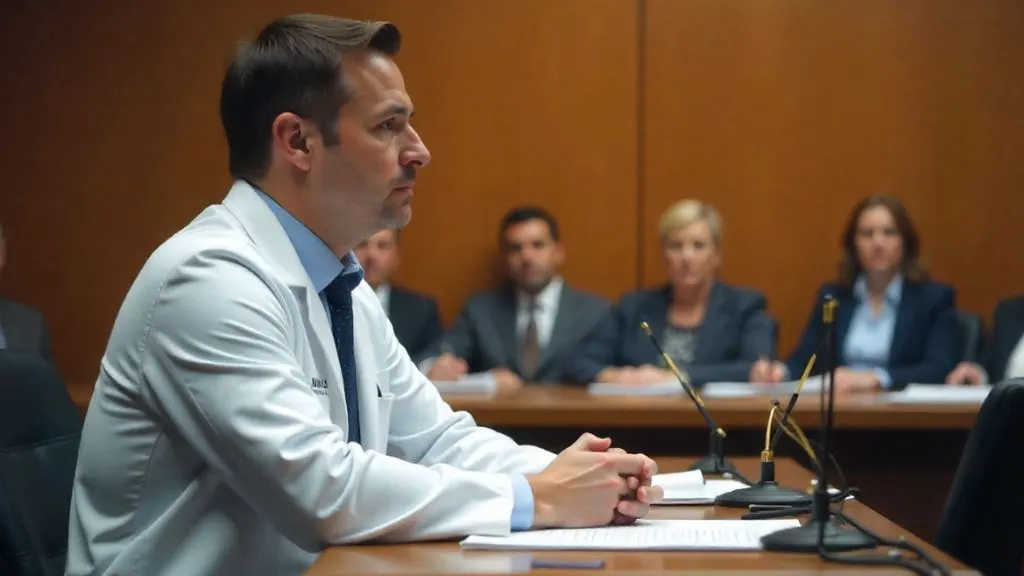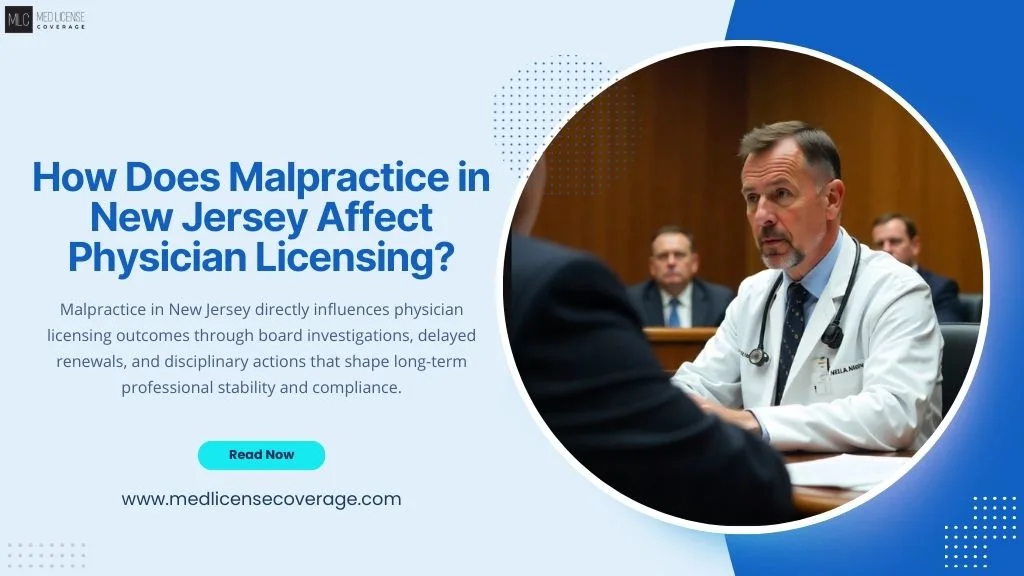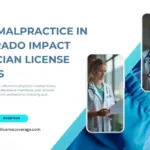Malpractice in New Jersey influences licensing outcomes. Each claim brings review by regulatory boards. Serious cases affect license approvals, renewals, and reinstatements. Oversight ensures public safety. Licensing decisions follow strict guidelines and documentation.
Oversight of Malpractice in New Jersey
The New Jersey Board of Medical Examiners reviews all malpractice cases. It monitors physician conduct and professional behavior. Confirmed malpractice may trigger immediate license restrictions. The board investigates patterns, risks, and ethical breaches. Each decision follows evidence-based assessments.

Malpractice Reporting Obligations
All malpractice in New Jersey must be reported. Settlements, judgments, and investigations fall under reporting rules. Hospitals and insurers submit reports to the board. Failure to report can lead to medical license suspension. Physicians must disclose all relevant events.
Disclosure Requirements for Licensing
Full disclosure is required for all license applications. This includes past malpractice in New Jersey and other states. Omitting case details leads to delays or denials. Applications undergo detailed review by credentialing authorities. Records are verified through national systems.
Investigations and Licensing Delays
Ongoing investigations delay physician licensing. The board waits for outcomes. Active cases result in pending status. Unresolved issues trigger background reviews. Investigations extend the timeline for both new applications and renewals.
Licensing Impact of Settlements
Settling a malpractice case doesn’t close the matter. In New Jersey, each settlement is reviewed. High payouts raise concern. Repeated settlements reflect ongoing risk. Boards assess case patterns before approving any license. Transparency and documentation are critical.
Evaluating Risk in Malpractice by State
Each state assesses malpractice differently. Malpractice in New Jersey follows its protocols. Medical boards analyze trends and disciplinary records. Multi-state applicants face added scrutiny. Uniform reporting is essential to avoid rejection. The process ensures interstate licensing consistency.
Effect on High-Risk Specialties
Malpractice risks increase in surgical and emergency specialties. New Jersey closely monitors high-risk fields. Repeated claims affect future licensing chances. Specialties with elevated risks receive detailed evaluations. The board considers case complexity, procedures, and patient outcomes.
Role of Medical License Suspension
Medical License Suspension can result from malpractice. New Jersey applies temporary or permanent suspension. Reinstatement depends on corrective steps. Suspension records stay on file and affect future reviews. Suspension also impacts credentialing and employment.
Hospital Credentialing and Licensing
Malpractice affects hospital credentialing. Hospitals may revoke privileges based on case details. New Jersey hospitals report actions to the board. A revoked privilege can trigger a license investigation. Credentialing teams verify all malpractice records.
Reinstating a License After Malpractice
Reinstating a license requires compliance with board conditions. This may include continuing education, monitored practice, and professional development. New Jersey requires clear evidence of reform. Documentation is essential for review and license recovery.
Continuing Education After Malpractice
After malpractice in New Jersey, boards require Continuing Medical Education (CME). Courses include ethics, patient safety, and recordkeeping. CME shows professional growth. Completion reports are reviewed during reinstatement. CME compliance supports a stronger application.
Documentation in Malpractice Defense
Accurate documentation defends against malpractice claims. New Jersey boards evaluate charting and patient records. Incomplete documentation increases risk. Strong records protect against liability and support license retention. Precision in documentation reflects professionalism.
Peer Reviews and Remediation
Peer reviews play a role in malpractice recovery. Remediation programs focus on ethics and patient care. New Jersey values peer input when considering reinstatement. Physicians must complete evaluations and demonstrate progress. These efforts show accountability.
Role of Licensing Services
Licensing services assist with complex applications. They ensure all malpractice disclosures are complete. These services help avoid medical license suspension. Professionals prepare appeals and manage documents. Licensing support improves approval chances.
Appeals in Malpractice Licensing Decisions
Appeals are allowed for denied licenses. New Jersey offers hearings and review panels. Evidence must support safe medical practice. Proper appeals show fairness in board actions. Legal support strengthens the case.
Background Checks and Malpractice History
Every application goes through background checks. Malpractice in New Jersey is tracked through state and national systems. Licensing boards verify each claim. Background discrepancies delay processing. Accurate records ensure smoother approval.
The importance of accurate disclosures.
Honest disclosure prevents delays. Undisclosed malpractice causes license denial. Boards expect transparency. Physicians must provide full case details. Discrepancies lead to investigation and possible disciplinary action. Disclosure builds trust.
Influence of Malpractice by State Policies
Malpractice by state shows regional differences. New Jersey laws emphasize public safety and transparency. Licensing boards review behavior patterns and outcomes. State-specific rules affect multi-state licensing. Applicants must adjust accordingly.
Malpractice impacts career mobility.
Malpractice in New Jersey affects professional movement. Denials in one state impact others. Medical license suspension becomes part of permanent records. Applications must address all issues to move forward. Clean records help maintain career flexibility.
Legal Representation and Malpractice
Legal counsel improves malpractice outcomes. Attorneys help present facts clearly. New Jersey licensing boards consider legal arguments. Representation increases fairness during hearings. A strong defense supports reinstatement.
The importance of Ethical Practice
Ethics are vital in New Jersey licensing. Boards evaluate trust, confidentiality, and patient rights. Ethical breaches contribute to malpractice. Restoring ethical integrity improves license chances. Courses and evaluations help correct past errors.
Technology in Application Processes
Digital portals manage malpractice disclosures. New Jersey requires online applications. Errors in upload cause rejections. Technology supports efficiency and transparency. Proper submission ensures timely review. Files must be accurate and updated.
Public Access to Malpractice Data
New Jersey maintains a public database. Patients and employers can review malpractice history. This access promotes accountability. Physicians must be aware of their public record. Transparency shapes reputation and trust.
Conclusion
Malpractice in New Jersey directly influences physician licensing. Claims lead to investigation, delay, or denial. Full disclosure, ethical reform, and education are essential for recovery. Licensing services offer key support. State compliance ensures long-term medical success







